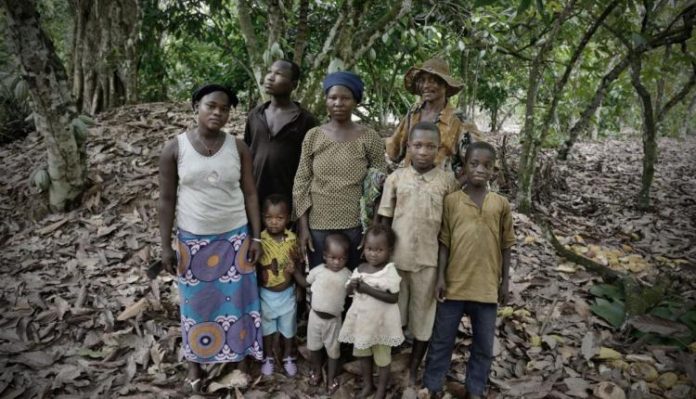To mark the launch of the 2020 Cocoa Barometer on the first of December, Solidaridad’s Isaac Gyamfi & Heske Verburg write about the need to change gear in the cocoa industry.
WITH EVERY BITE OF OUR FAVOURITE CHOCOLATE BAR, WE SWALLOW THE DELICIOUS PRODUCT OF A BROKEN SYSTEM THAT NEEDS OVERHAUL.
The cocoa industry is profiting from disempowered cocoa farmers, and despite twenty years of warnings about exploitation, deforestation, and child labour, the industry has achieved very little to make things better. But now, there are enough calls in the cocoa community to make the changes that would end these practices. The battle to stop cocoa poverty has finally come.
The State of Cocoa
The pervasive problems in the global cocoa industry have resurfaced with the latest publication of the Cocoa Barometer – a major report on the sustainability of the cocoa sector published every two years. It reveals that little progress has been made to improve the systemic challenges facing the future of cocoa.
While Covid-19 has caused a dip in demand, we fully expect the long term demand for cocoa to be resilient. Cocoa farmers have worked hard to meet this demand; and while cocoa production in West Africa alone has almost tripled in the past 30 years to meet global demand, farmers are still poor. The price of cocoa has been stubbornly low for a long time.
There have been many interventions by various actors in the last couple of decades to address the pervasive problems. Needless to say, these interventions have not yielded the results we need for a lasting impact on farmers and their communities.
Why Is It So Difficult?
Persistent problems in the cocoa sector have a common cause; poverty.
Farmers are in poverty through a lack of living income. A lack of a living income leads to unsustainable farming practices, including deforestation linked to cocoa farming, and the pernicious problems of irresponsible labour practices including a child and forced labour.
The last 20 years of activity has partly failed because the industry’s engagement with farmers has been inadequate, and failed to address the needs of raw material producers. Failing to include farmers in the design of these interventions meant that one after another, ‘top-down’ projects and initiatives were decided using industry-based approaches. The root causes of poor cocoa prices, poor infrastructure, poor transparency, and poor accountability were unaddressed, leaving farmers poor.
Farmer-centric Approach.
Cocoa farmers’ poverty persists also because of the unequal bargaining power between cocoa farmers, and both large multinational companies and governments. Despite Ghana and Côte d’Ivoire’s governments collaborating to improve prices for their farmers, the stronger position of the larger traders, processors, and retailers means that cocoa farmers are ‘price takers’. Despite the range of options available for these larger organizations, including redirecting dividends, the Barometer report makes it clear; companies say they would pay their cocoa farmers more, but only if their competitors do it first.
To make everyone pay, a level playing field is needed. Refreshingly though, some companies are beginning to break cover and call for regulation to make this possible. Finally, many in the sector are now overtly admitting farmers must be paid a living income.
Solidaridad has been working to make supply chains more inclusive for over 50 years, and with momentum building, our expertise in how to take a farmer-centric approach is crucial as these discussions progress. We will empower farmers and civil society organizations from producing countries to enable them to be part of the much-needed inclusive conversation. We will also advocate for policymakers to adopt policies that drive corporate accountability and support farmer inclusivity. With this call, we play our part as a civil society organization.
A thorough process is needed to develop effective policies, and we are pushing for a different approach that’s inclusive. With our Civil Society partners, we have already published recommendations for inclusive partnership development between the European Union, Côte d’Ivoire, and Ghana Governments. We believe that three critical shifts are needed to push the cocoa sector fully into its highest sustainability gear:
1.Refocus From Technical To Political Solutions.
Most cocoa sector sustainability efforts have been looked at through a technical lens. Much of the discussion on deforestation and agroforestry focuses on technical aspects of what makes a good agroforestry system, and the lack of living incomes has been addressed through productivity increase, income diversification, and increasingly self-managed financial inclusion mechanisms (VSLAs). These are all valuable approaches, but they are not enough if you don’t discuss the elephant in the room: unequal value distribution and unequal power. Power in the form of bargaining strength, but also the power that comes with having social and political influence. It is time to balance these technical approaches with stronger political commitments and solutions by both national and international governments and the cocoa industry and to implement the payment of fair prices through sustainable arrangements.
Small and technical tweaks are just not enough anymore. The necessary changes require a culture-shift and real political ambition, commitments, and actions.
2.Ensure Inclusivity And Redistribute Value And Power.
There is a real need for multi-stakeholder forums where all stakeholders can sit together to discuss and resolve issues. We know from experience that if you don’t meaningfully and permanently involve farmers in discussions about how the industry works, at all levels, they remain disenfranchised, and then initiatives serve only the industry’s needs or governments’ revenue needs.
Inclusivity helps ensure actions are fully integrated into local socio-political and economic contexts, so they can survive longer than the lifetime of just one project, and reach true farmer and community interest. Civil society institutions play an important role here.
For this to be effective, barriers to participation must be overcome. Especially important is involving women, who face more challenges to having the voices heard despite the essential role they play in agricultural work.
3.Move From Voluntary To Mandatory Frameworks.
Voluntary standards just aren’t going to do the job, and the increasing numbers of cocoa companies asking for an EU due diligence regulation are proof enough of the momentum for change.
For companies, there are clear benefits. Mandatory due diligence regulation provides some clarity and certainty. It will mean that the entire sector needs to act and, importantly, that companies can be held accountable for their actions and face consequences if they fall short. It would level the playing field by requiring all competitors to operate according to the same principles, and corporations could no longer use competition as a reason to ignore human rights abuses or environmental degradation.
For Solidaridad, those frameworks have to address fair prices. This is achievable through inclusive dialogue and engagements.
The Growing Momentum For Change.
The biggest prize could be that regulation enables more joined-up efforts. No more hit-and-miss standalone initiatives, but a real systemic movement with farmers at its heart.
The good thing is that cocoa won’t be alone in doing this. Other sectors are catching up with their own debates on introducing sustainability regulations. They all share similar traits; harnessing the growing political and ethical momentum to introduce mandatory sustainability regulation, involving farmers and workers as core partners in decisions, and ultimately ensuring that global companies value the farmers and communities who grow and produce the world’s food for the long term.
How We Can Help.
A functioning cocoa sector is one where farmers are respected enough to be listened to and to be paid a fair price for what they give us – a taste of something rich, distinctive, and satisfying.
Whether you are the government of a producing or consuming country or just a passionate chocolate-lover, the 2020 Cocoa Barometer gives some clear actions you can make. The report is published by the VOICE Network, with support from Solidaridad and many other organizations working towards a more sustainable cocoa sector. We know how to work in partnership.
We both challenge and help companies and governments create more farmer-centric approaches. You can rely on us to help you achieve that.
The Cocoa Barometer 2020 has now been published.
Source: wwww.thecocoapost.com








